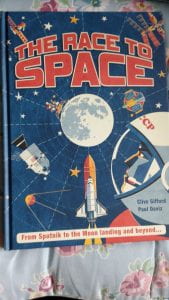
Words & Pictures, 9781786038890
“The Race to Space” by Clive Gifford and Paul Daviz. The author has been writing information books for young people for a long time and is recognized as an important part of the non-fiction book world. This book looks at the chronology of the race to put men into space and then on to the Moon. The illustrations are absolutely stunning, with a somewhat retro-style, reminiscent of 1950s soviet art at times. The colour palette is very bright, although there is a flatness to the tones that reflect older methods of printing. This is definitely a book to sit and browse through. It is very much a book that will appeal to the artists as well as to the historians and scientists and it should be in all primary libraries.

Wide-eyed editions, 9781786030917
“When we walked on the Moon” by David Long and Sam Kalda is yet another book that has been produced to commemorate 50 years since man landed on the Moon. It looks at the missions, from Apollo 11 to Apollo 17, all of which had astronauts land on the surface of the Moon and undertake a series of experiments, as well as playing golf etc! This is a simple introduction that deals with the main characters and I particularly like the sketches of the crews, together with facts about missions, that are found at the back of the book. The illustrations once again hark back to the start of the space race, but they are much brighter than in some other titles and there is a greater use of a white background.
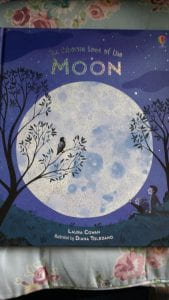
Usborne, 9781474950848
“The Usborne Book of the Moon” by Laura Cowan and Diana Toledano has a much wider look at the moon and is aimed at the bottom end of KS 2. It covers everything from the space race to mythology, as well as astronomy and geography. As you would expect from the publisher there are some brilliant illustrations and a lot of information, given in small bite sized chunks that will work well with the intended audience. This has a good index which makes it particularly useful for schools, although I think a lot of young enthusiasts will just enjoy dipping in to this lovely book.
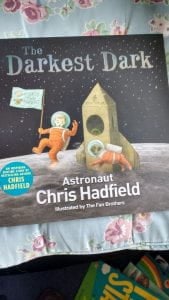
Macmillan, 978509824090
“The Darkest Dark” by Chris Hadfield and the Fan Brothers. This is a picture book based on the childhood o the astronaut Chris Hadfield; it tells of his fear of the dark and how seeing Apollo 11 helped him realize that the darkness of space could be fascinating and inspiring rather that frightening. As a story, this can be read as a straightforward tale of space and imagination, or it can be used as a starting point when learning about space and the 50th anniversary of the Moon landings.
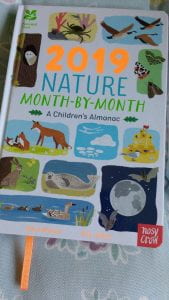
Nosy Crow, 9781788003391
“2019 Nature month by month” by Anna Wilson and Elly Jahnz has been written for the National Trust and takes a look at the fascinating things that are going on around us throughout the year. Anna Wilson is well know as a writer of fiction for children, but she is also keen on nature and wild swimming, so this is close to her heart. This is an absolute treasure trove of information and covers things such as festivals, food, events and crafts relating to many of these activities. The book is beautifully illustrated but perhaps the most striking part of my copy was the fluorescent orange end papers to the book, which made me want to hunt out my sun glasses. I look forward to seeing if there is a new book for 2020.
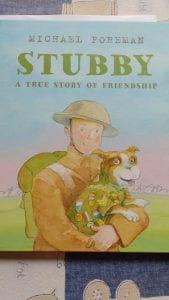
Andersen Press, 9781783447435
“Stubby” by Michael Foreman is another in his retelling of true stories set in the First World War. This recounts the story of of how American troops, sent to the front in 1917, made a mascot of a little stray dog they named Stubby. Miraculously the dog and his human carer survived the war and Stubby lived until 1926. This is a beautifully illustrated story with very simple text and it will make an excellent introduction to the subject of the war.

Pavilion, 9781843653745
“Adventures in Space” by Simon Tyler is a stunningly illustrated book about space and about man’s attempts to leave the Earth and explore our neighbours. The first half of the book looks at astronomy, the planets and the wider universe, so that we get a clear and well explained explanation of what is out there. The second half of the book gives a brilliant timeline of how space exploration was achieved and what each major power produced as its space craft. The information is truly up to date and even looks at prospective launches in 2020 and beyond. There is also information about satellites and the International Space Station, making this a perfect start for anyone who loves space. Unusually the pages are black, with white text, but the images tend to have been brightly coloured, so they stand out against the page. Definitely recommended.
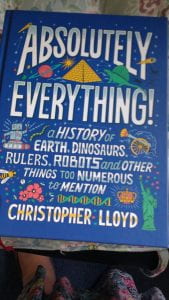
WhatonEarth Books, 9781999802820
“Absolutely Everything” by Christopher Lloyd, illustrated by Andy Forshaw, Justin Poulter and Will Exley is the sort of book that I would have loved to have received as a child. It tells the history of the world in a chronological way, but with overlaps as we look at different parts of the world and what was happening in different civilizations. The illustrations have a feel of the 1950s but with a bit of a modern twist.
“Mary who wrote Frankenstein”, (originally called “Mary and Frankenstein”) by Linda Bailey and Julia Sarda is a beautifully  told introduction to the life of Mary Shelley (as she became) and how she came to write one of the most enduring stories in English Literature. The illustrations are a tour de force by Julia Sarda and the sophisticated and highly stylized images really bring the text to life. This would make a really good introduction to the young reader who is about to read the story itself; it also works as a good basis for learning about ‘Gothic tales’ and their popularity at the beginning of the 19th Century.
told introduction to the life of Mary Shelley (as she became) and how she came to write one of the most enduring stories in English Literature. The illustrations are a tour de force by Julia Sarda and the sophisticated and highly stylized images really bring the text to life. This would make a really good introduction to the young reader who is about to read the story itself; it also works as a good basis for learning about ‘Gothic tales’ and their popularity at the beginning of the 19th Century.
“Wild facts about Nature” by Andy Seed and Scott Garrett is yet another brilliantly funny and informative book by this author. It is written under the auspices of the RSPB and is full of facts, jokes and stories all about nature. This is definitely one of those books that young readers will keep dipping in to and will become a favourite for quizzes, long journeys and sharing with friends. This is highly illustrated and definitely one for those who love books such as “Horrible Histories” etc.
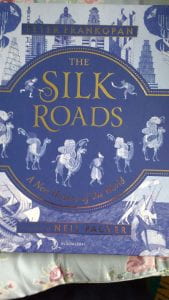
Bloomsbury, 9781408889935
“The Silk Roads” by Peter Frankopan and Neil Packer is a truly delightful book bringing a fresh look at the developing history of the world; told through the development of trade routes along the silk roads and then wider trade routes. The original book was written for adults but then this junior version was created. The cover can only be described as sumptuous, with its blue and gold images and lettering. The illustrations throughout are complex, colourful and based on the artistic style of the civilization being discussed. This brings the history of the word into one book and helps us to understand the links between different countries and their development over the centuries. We often forget that history is a blending of all the influences that are in play at any given time and this book helps bring it all together. I really loved this and I look forward to reading “The New Silk Roads” which looks at these relationships as they are today.
There has been a real resurgence in the publishing of information books, mainly led by the rise in general interest books rather than in those intended for the curriculum. The winning of the Kate Greenaway medal by “Shackleton’s Journey” gave a real boost to this sector and there have been several new and innovative publishers who have revitalized the market. From this small selection you can see that there has been a swell in the number of titles looking at space and the moon, particularly as we reach the 50th anniversary of the moon landing. However there are plenty of books out there if you love, history, nature art and a whole range of fascinating subject, just go out and enjoy the delightful buffet of books.
